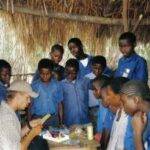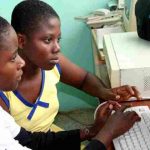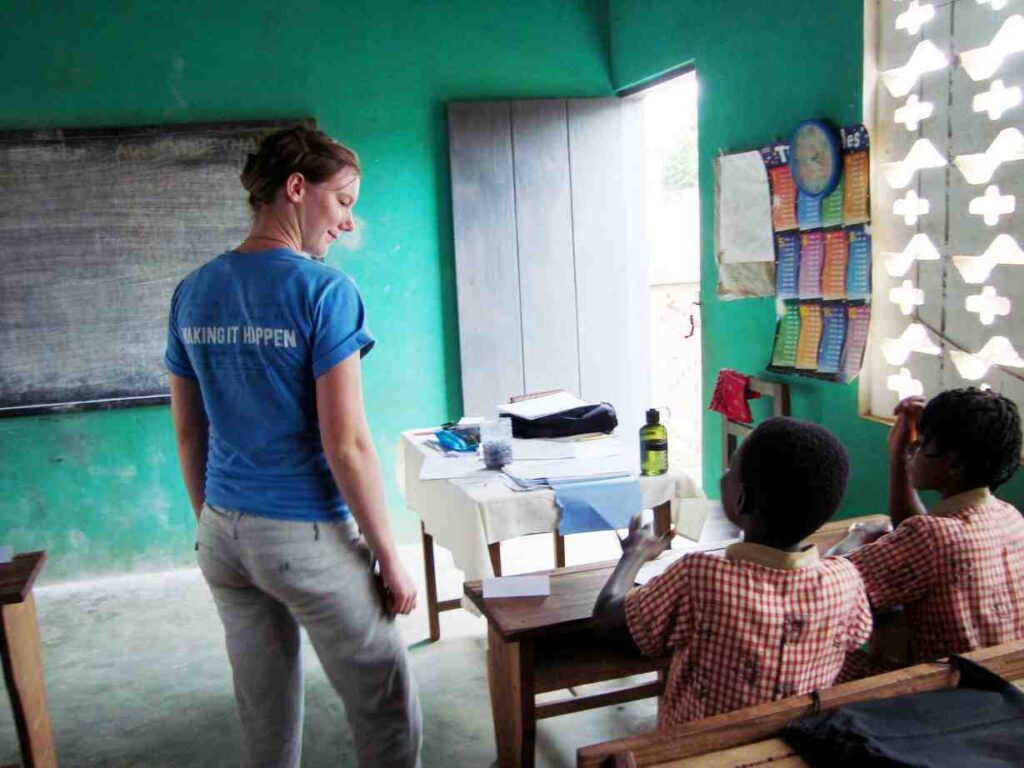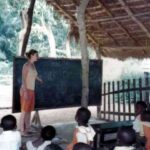- The program
- The schools
- The accommodations
- The feeding
- Entertainment and sight-seeing
- Volunteers’ safety
- Minimum qualification
- Rough estimate of total cost involved
- Apply for this program
- Next steps — after you have been accepted
- Other relevant facts about the program
- Sign up for our Newsletter
- Submit a question
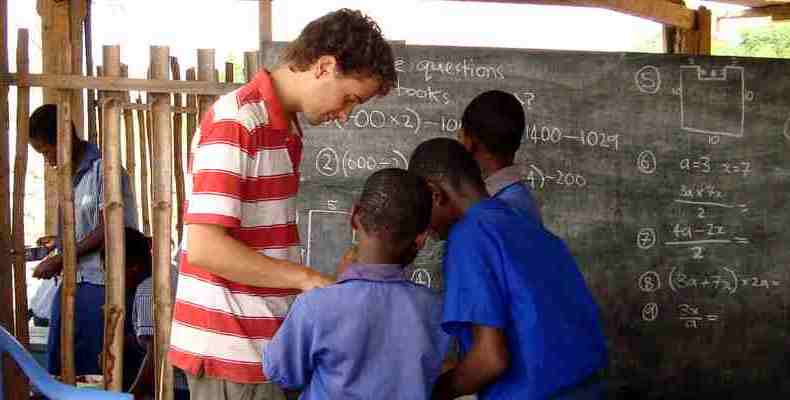
The program
This program is designed for volunteers to teach Math to Ghanaian school children in Primary (Elementary) and Junior High schools based on the Ghana basic education curriculum. This curriculum is designed to help the pupil:
- Develop basic ideas of quantity and space
- Use basic mathematics and necessary strategies for solving problems encountered in daily life by recognizing relationships between numbers
- Reason logically by selecting and applying criteria for classification and generalization
- Communicate effectively using mathematical terms and symbols
- Use appropriate instruments for various systems of measurement
- Carry out investigations using various mathematical ideas and operations
- Develop the habits of diligence, perseverance, confidence and precision as a result of their mathematical training
You can teach the subject to any one (or more) of eight different classes (or ages).
- Primary class 1 (mean age of 6 years). Read excerpts of the curriculum
- Primary class 2 (mean age of 7 years). Read excerpts of the curriculum
- Primary class 3 (mean age of 8 years). Read excerpts of the curriculum
- Primary class 4 (mean age of 9 years). Read excerpts of the curriculum
- Primary class 5 (mean age of 10 years). Read excerpts of the curriculum
- Primary class 6 (mean age of 11 years). Read excerpts of the curriculum
- Junior High 1 (mean age of 12 years). Read excerpts of the curriculum
- Junior High 1 (mean age of 13 years). Read excerpts of the curriculum. Back to top
PRIMARY 1 MATH – Curriculum excerpts
Pre-Number Work, Groups of objects, Counting objects, Addition (up to 9), Solid shapes, Subtraction (0-9), Tens and Ones, Measurement of length, capacity and mass, Measurement of time and money, Collecting and handling data… (A more detailed curriculum will be provided to you — after you have applied and confirmed your participation in the program) Top
PRIMARY 2 MATH – Curriculum excerpts
Numbers and numerals (0-100), Addition (0-18) Subtraction (0-18), Numbers and numerals (0-1,000), Measurement of length, capacity and weight, Addition (0-999), Subtraction with numbers less than 100, Measurement of time and money, Multiplication, Division… (A more detailed curriculum will be provided to you — after you have applied and confirmed your participation in the program) Top
PRIMARY 3 MATH – Curriculum excerpts
Numbers and numerals (0-10,000), Addition and subtraction (sum up to 9,999), Length and area, Fractions I, Collecting and representing data as a graph, Estimating and measuring capacity and mass, Multiplication of numbers, Shape and space, Division, Plane shapes, Measurement of time and money, Fractions II… (A more detailed curriculum will be provided to you — after you have applied and confirmed your participation in the program) Top
PRIMARY 4 MATH – Curriculum excerpts
Shape and space, Numbers and numerals (0-1,000,000), Addition and subtraction (Sum up to 100,000), Measurement of weight/mass and time, Fractions I, Multiplication, Division, Fractions II, Measurement of Length and area, Shape and space II, Collecting and handling data… (A more detailed curriculum will be provided to you — after you have applied and confirmed your participation in the program) Top
PRIMARY 5 MATH – Curriculum excerpts
Numbers and numerals (0-1,000,000), Sets of numbers I, Shape and space I, Addition and subtraction (Sum up to 1,000,000), Measurement of weight/mass and time, Multiplication, Division, Area and volume, Shape and space II, Operations on fractions, Decimal fractions and percentages, Collecting and handling data, Number plane, Ratio, Measurement of time… (A more detailed curriculum will be provided to you — after you have applied and confirmed your participation in the program) Top
PRIMARY 6 MATH – Curriculum excerpts
Sets of numbers, Operations on fractions, Addition and subtraction (Sum 0-10,000,000), Decimal fraction and percentage, Measurement of length, capacity and mass, Ratio and proportion, Shape and space, Multiplication and division, Measurement of area and volume, Money, Chance, Number plane… (A more detailed curriculum will be provided to you — after you have applied and confirmed your participation in the program) Top
JUNIOR HIGH 1 MATH – Curriculum excerpts
Sets, Fractions, Shape and space, Length and area, Powers of natural numbers, Introduction to the use of calculators, Relations, Algebraic expressions, Capacity, mass, time and money, Integers, Geometric constructions. Decimal fractions, Percentages… (A more detailed curriculum will be provided to you — after you have applied and confirmed your participation in the program) Top
JUNIOR HIGH 2 MATH – Curriculum excerpts
Numeration systems, Linear equations and inequalities, Angles, Collecting and handling data, Rational numbers, Shape and space, Geometric constructions, Algebraic expressions, Number plane, Properties of quadrilaterals, ratio and proportion… (A more detailed curriculum will be provided to you — after you have applied and confirmed your participation in the program) Top
The schools
VIGS GHANA partner schools are located in many villages, towns and cities in the coastal belt. From Sega in the east through Prampram, Aburi, Tema, Bawjiasi, Accra and all the way to Twifu-Mampong and Takoradi in the west. We also have partner schools in the middle parts of Ghana (Kumasi). Back to top
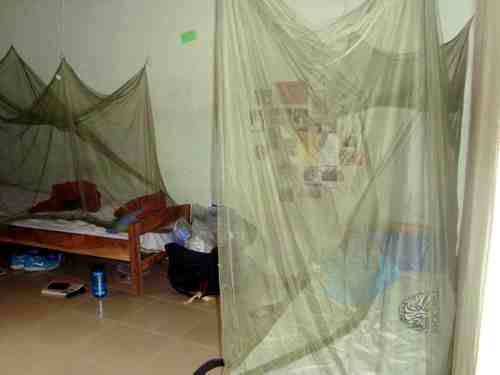
Most of the accommodation is with carefully-selected host-families, with a couple of dedicated volunteers’ apartments. You would be placed in the same home with another volunteer — except you specifically state that you prefer to be placed alone. Volunteers coming as a pair or couple will not be placed with other volunteers in the same bedroom. Volunteer(s) have their separate room – with a lock and key. There are two beds in the volunteers’ room; each with a mattress and in most cases a table and chair. It is advisable to bring along a mosquito net and a spare bed sheet. Many homes have a shower and flush toilet. In others you would have to manage with a bucket of water and a pit toilet – more likely in smaller towns and villages. Laundry is usually done with a couple of buckets. Back to top
The feeding
You will be served three meals daily. Breakfast is usually tea/ coffee/ oats or corn porridge and bread with jam/ butter/ egg omelet. Lunch could be plantain or rice or yam with vegetable stew or similar. Dinner could be rice, yam, pasta or plantain with vegetable sauce or stew or soup. For dessert you’d be served an orange or pineapple. Back to top
Entertainment and sight-seeing
Weekends are free days. You may choose to travel out of town to see the many interesting sights and sounds in other parts of Ghana or hang out with your fellow volunteer(s) and/or locals in the neighbourhood. VIGS GHANA frequently puts together sight-seeing trips: as a volunteer on one of our programs, you’ll first be given the option to sign-on to our tours. The remaining slots will be offered to the general public. Back to top
Volunteers’ safety
Your safety is of paramount importance to VIGS GHANA. As such we give you all the relevant safety tips, plus we place you only in places where good medical services are within easy reach. In addition, we’ll give you a smart phone – so you can call or text or email or Whatsapp the in-country supervisors whenever the need arises. Our in-country support staff are on call 24 hours a day, 7 days a week. Back to top
Minimum qualification required of volunteers for the program. Applicants for this program must have at least completed high school. Back to top
Rough estimate of total cost involved
- Flight to and from Ghana: US$600-1250 (Round-trip)
- Ghana visa: US$80-170
- Vaccinations: US$150-250
- Travel Insurance: US$70-320
- Miscellaneous personal items: US$300-900
- Personal Spending money whilst in Ghana: US$200 upwards
- VIGS GHANA Program fee: starts from US$450
So, a rough estimate of the total cost for a two-week program duration would be about US$1,870 – 3,560. Check the equivalent in your currency. Back to top
Next steps — after you have been accepted
After you have been admitted to participate in the program, you would now have to execute the following:
- Book a flight. See our flight information page. The earlier you book and confirm your flight, the better.
- Go through the suggested checklist of things to do and bring and start getting (or packing) them
- Send us your flight itinerary
- 60-30 days before your departure date, you must start processing for your Ghanaian visa. VIGS-GHANA will provide you with the needed references in Ghana — which are needed to obtain a Ghanaian visa
Back to top
Other relevant facts about the program
- Minimum volunteering/internship duration: 1 week.
- Maximum duration: 6 months.
- Age range accepted: 18 – 75 years.
- We will send you a document on how to fund-raise for your trip – after you’ve confirmed your participation.
- We will meet you at the Airport in Accra (ACC) on your arrival day.
- We will give you a smart phone with internet and IDD (International Direct Dialing) capability on your arrival day.
- The average work day is 3-8 hours for this program.
- Saturdays and Sundays are free days.
- You can contact VIGS GHANA local staff on cell phones all the time — 24 hours a day — seven days a week.
- We can give you a Testimonial on successful completion of your volunteer or internship work.
- You can pay the program fee through any of the following methods:
- PayPal or credit card.
- Cash installments (or full payment) upon arrival into Ghana.
